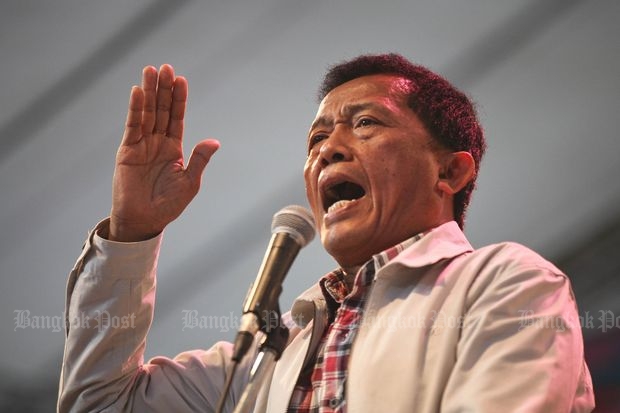
The junta has invited former Pheu Thai MP Worachai Hema for an "attitude adjustment" session after he criticised the draft constitution.
He told reporters on Friday that an army officer had contacted him, saying the army would like a word about comments he had made the day before. Soldiers came to pick him up at his house on Saturday morning.
"I made the comment because I'm Thai and I care for this country. I don't want to see a repeat of the May 1992 incident," Mr Worachai said, referring to the violent suppression of protests against coup leaders. "I want to urge them to write a charter that is acceptable to people, one that won't add or create new problems.
"Don't think all politicians are bad. They are chosen by the people so they have to answer to them."
Col Winthai Suwaree, a spokesman for the National Council for Peace and Order (NCPO), said on Saturday that Mr Worachai was taken for talks at Military Circle 11 because his recent expression of opinion had not been constructive.
"He derided and looked down on other people in an accusing manner and without proof in most cases," the colonel said.
The former MP's behaviour could lead society to misunderstand the people he implicated and create confusion and conflict, he added. "His behaviour overall is not in line with the direction of peace and order and out of sync with the atmosphere of bringing the country forward.
"We will use the typical means of giving him a warning and correcting his misunderstanding together with asking for cooperation first."
On Thursday, Mr Worachai was quoted by media outlets as saying that if the constitution did not pass in the referendum, Prime Minister Prayut Chan-o-cha had to take responsibility.
The former Samut Prakan MP was responding to Gen Prayut's earlier comment that he had done his best and if the constitution was rejected in a public vote, all sides, including the people, had to take responsibility.
Mr Worachai said: "People did not get to choose the writers. Gen Prayut appointed them and they did their duty by his order and within the framework of the interim charter, which was written by the NCPO, led by Gen Prayut.
"Therefore, Gen Prayut has to take the most responsibility, not the people, who are the owners of the power.
"How could the people take responsibility when they don't get a chance to determine their own future? Other people are doing it for them.
"When people think [the charter is] undemocratic — and the referendum will also be held when Section 44 is in place to suppress dissent — they won't endorse the draft. And Gen Prayut is the one to take responsibility. He must resign if it doesn't pass.
"Extending power is a tricky business as the May 1992 uprising taught us. If it happens again, it will be a crisis over a crisis," Mr Worachai said.
"When no party wins a majority vote, small parties will join hands and bring in an outsider to be PM. Those opposing the NCPO might not win or might win by a small margin. But if they manage to come in, they will be toppled by many traps, deepening the conflict."
